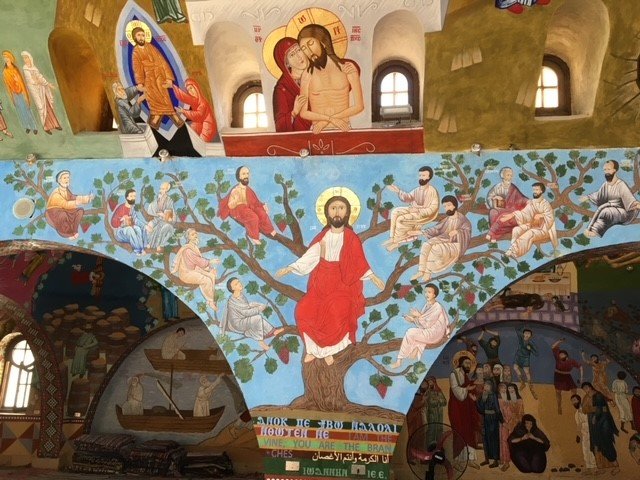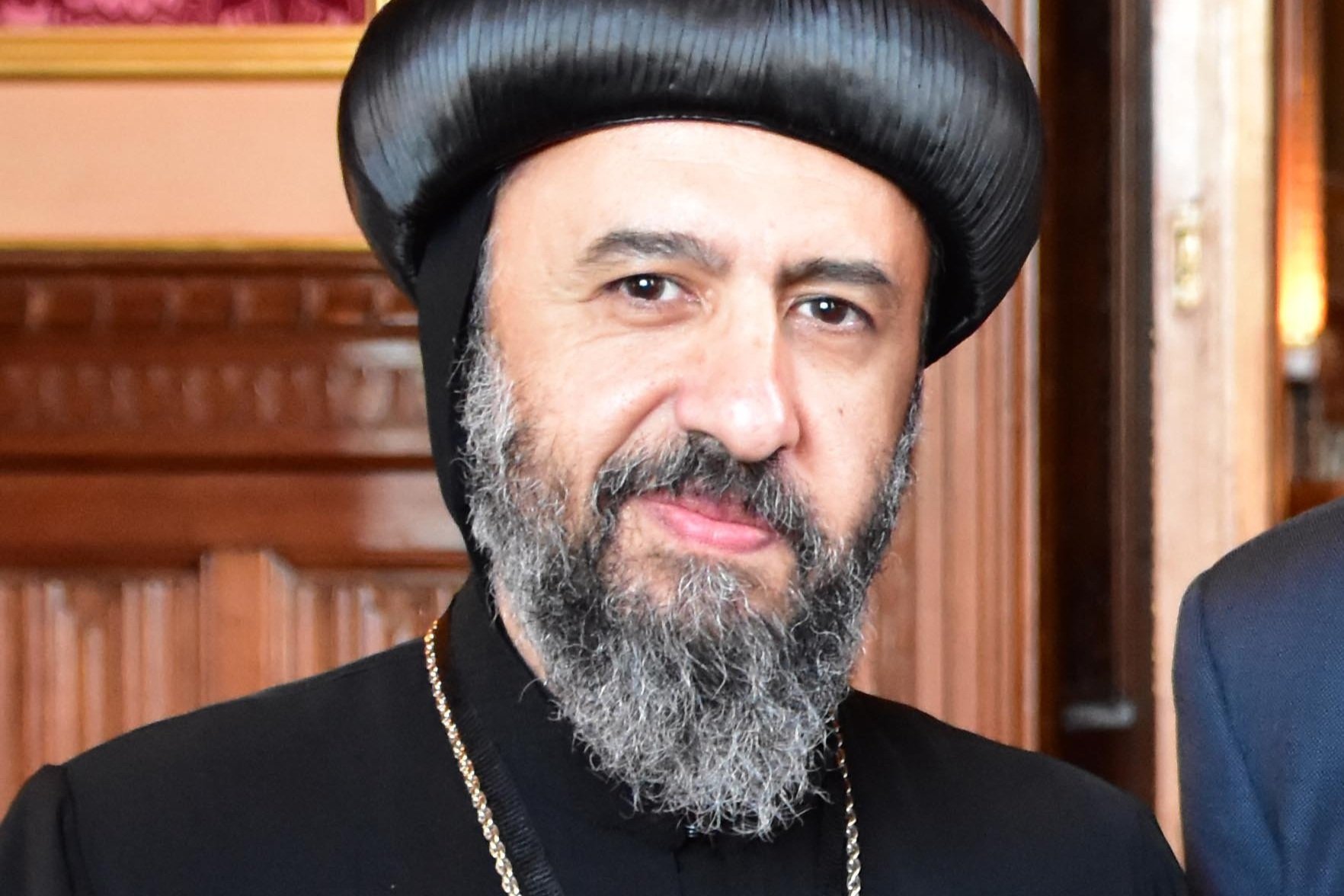
Anafora chapel, Egypt.
CHRISTIANS IN EGYPT
According to tradition, Christianity was brought to Egypt by St Mark the Evangelist around AD49. Egypt’s three oldest denominations, the Coptic Orthodox, Greek Orthodox, and Coptic Catholic churches, all trace their origins to this point. In the 1800s, Anglican and Presbyterian missionaries came to Egypt and established churches.
How many Christians are in Egypt today?
Christianity is the second religion in Egypt after Islam. There are no official figures and estimates vary, but it is thought that between 5-25% of Egypt’s 109 million population are Christian. Christians in Egypt are known as ‘Copts’ - a people group distinct from the country’s Arab population, who historically used their own language and calendar.
95% of Egyptian Christians belong to the Coptic Orthodox Church, which is part of the Oriental Orthodox family of churches. The other 5% is made up of members of the Eastern (Greek) Orthodox Church, the Coptic Catholic Church, the Anglican/Episcopal Church, and the Evangelical Presbyterian Church.
While Christians reside throughout the country, they are particularly concentrated in areas of Upper Egypt (the southern part of Egypt) and in major cities such as Cairo and Alexandria.
What are the challenges facing Egyptian Christians?
Freedom to practice Christianity (as well as Islam and Judaism) is officially protected in the Egyptian constitution, but Christians often feel marginalised. Although some Christians have held prominent positions in politics, they are generally underrepresented in this arena, as well as in senior roles elsewhere in society.
After Egypt’s 2011 Revolution forced long-time president Hosni Mubarak to resign, Mohammad Morsi from the Muslim Brotherhood, an Islamist party, was elected president. Christians feared for their future as Morsi sought to change the constitution to increase his powers. As such they welcomed the 2013 coup d’etat which replaced him with Abdel Fattah el-Sisi, then head of the Armed Forces. In the days after the coup, there were widespread attacks on Christian communities and churches by Morsi supporters, but Christians now say that under Sisi’s regime they feel protected from further Islamic extremism.
Historically Christians needed presidential approval to make even small repairs to churches, while the same was not the case for mosques. This means many church buildings are unsafe, leading to fires in which people have died. However, these regulations have now been eased.
Other challenges faced by Egypt’s Christians apply to all citizens, including the increasingly severe economic crisis in Egypt, which is causing a cost-of-living crisis for many. Citizens are also denied their right to freedom of expression and association, and at risk of arbitrary detention and enforced disappearance. You can find out more here: Human rights in Egypt Amnesty International.
HEAR DIRECTLY FROM CHRISTIANS IN THE EGYPT
FINDING HOPE IN HARD PLACES - DINA FROM EGYPT
CONVERSATIONS WITH MIDDLE EAST CHRISTIANS: EGYPT
ARCHBISHOP ANGAELOS: CHRISTIANITY IN EGYPT
What impact does the Christian community in Egypt have?
Like Christian communities across the world, Egyptian churches place importance on showing God’s love in practical ways, and run many social support projects as well as specialist schools and hospitals. The Coptic Orthodox Church’s Bishopric of Public, Ecumenical and Social Services (BLESS) works in over 50 communities across Egypt. Refuge Egypt, based at the Anglican Diocese of Egypt, provides support for refugees and Think and Do, a ministry of the the Evangelical Fellowship in Egypt, empowers marginalised women in Upper Egypt. All these projects are supported by Embrace.
Egypt’s long Christian history means it is rich in early Christian sites, which are popular tourist attractions – including places where the Holy Family are believed to have stayed after they fled from King Herod. Egypt also has the oldest monastery in the world, the Monastery of St Anthony – one of the Desert Fathers, the founders of Christian monasticism.
LATEST FROM OUR EGYPT PROJECTS

THE HISTORY OF CHRISTIANITY IN EGYPT
According to tradition, Mark the Evangelist brought the Christian faith to Egypt in the first century. But it wasn’t until Bishop Demetrius of Alexandria (AD 189-232) that Christianity began to really grow and flourish. A theological school was formed at this time (the Catechetical School of Alexandria), which became an important centre of Christian teaching and research. During his career, Bishop Demetrius ordained three bishops. The number of bishops in Egypt grew massively over the following century, with some 94 Egyptian bishops attending the synod of Serdica in AD 342.
The Egyptian Christian community suffered intense persecution under the Roman Empire. The last wave took place during the reign of Emperor Diocletian (AD 284-305), when churches were destroyed and Christians were tortured and executed for refusing to worship the Roman gods. The Coptic Church refers to this period as the Era of the Martyrs. The oppression continued until AD 312, when Emperor Constantine’s conversion established Christianity as the state religion.
Alexandria remained an important centre of theological learning over the coming centuries. There were sometimes tensions between Alexandria and the newer Christian capital, Constantinople, with mutual suspicion of one another beginning to cause rifts between the churches. This culminated in 451 AD, when Coptic Christians split from the Roman Catholic Church at the Council of Chalcedon over disagreements about the true nature of Christ. The Church in Egypt split into two: the Greek Orthodox Church of Alexandria accepted the Council’s decision, while the Coptic Orthodox Church did not. The two Churches remain distinct entities today.
In the 7th century, Egypt was invaded and conquered by the Islamic Caliphate. Following the conquest, Egypt was governed by a series of Arab Caliphates. By the 12th century Islam had become the major religion in Egypt. Under Islamic rule, Coptic Christians were assigned Dhimmi status (a historical term for non-Muslims living in an Islamic state with legal protection) and compelled to adhere to the Pact of Umar (a treaty specifying the rights of and restrictions on non-Muslims living under Islamic rule).
The Islamic period was generally characterised by tolerance, notwithstanding certain restrictions imposed on Christians and pockets of more intense pressures periodically. The status of Coptic Christians was elevated in the early 19th century. The tax on non-Muslims was abolished and Copts were allowed to serve in the army. Later on in the same century, Copts were appointed as judges in Egyptian courts, given representation in government, and flourished in business affairs.
It was also during the 1800s that the first Anglican presence in Egypt was established, along with other Protestant denominations, by western missionaries.










